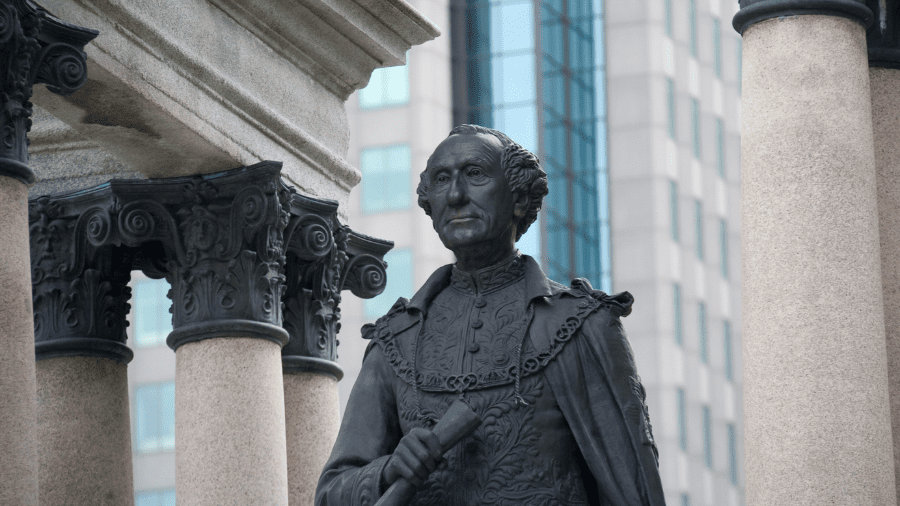By Patrice Dutil, December 1, 2022
A City of Montreal ad hoc committee examining the future of the Sir John A. Macdonald statue in downtown Montreal, which was pulled to the ground by a mob in the summer of 2020, has recommended that the bronze artwork not be reinstated. In its place, it proposes displays that would give “a voice to the victims of Macdonald’s policies and give them a space to testify.”
The committee’s report is a short-sighted document that justifies vandalism and insults history.
In characterizing the 2020 vandalism as “part of a national movement rejecting the legacy of the first Prime Minister of Canada,” the committee has apparently forgotten that the protesters who ransacked the 19th-century monument were actually demanding the defunding of Montreal police, in the aftermath of the George Floyd killing in the US.
The report, however, chooses to focus on the committee’s view that Macdonald’s values no longer fit with Montreal today. His sin was to pursue “assimilation and genocidal policies” against “some indigenous peoples” and perpetrate discriminatory acts “against several groups of people whose consequences are still painful and palpable for several communities.”
Montreal, according to the report, must distance itself from Macdonald and his “colonial vision.”
The report is replete with errors and gravely misinformed. For anyone wondering who could write such nonsense, we will not know since the identity of the writers remains a secret.
This committee is wrong to make such a recommendation. It sends the message that it is acceptable to demolish civic monuments and that the decisions of our ancestors are shameful.For the record, Sir John A. Macdonald was elected Prime Minister of Canada in 1867 and was subsequently re-elected five times. The committee seems utterly oblivious to the fact that Quebecers gave Macdonald a majority of votes on every occasion, including in 1891 when he defeated the “favoured son” Wilfrid Laurier – six years after the hanging of Louis Riel.
It is no small omission to ignore the fact Macdonald’s policies had the democratic support of Montrealers, and that they considered it favourable. His monument — the result of democratic fundraising, that is, paid for by his friends and supporters, not the government — was inaugurated before a crowd of more than 10,000 people.
To accept today that this monument was taken down by unelected bandits is not only an insult to the memory of Macdonald, but also to those who voted for him because he represented, despite everything, the most beautiful promise from Canada.
The approach taken by the secret committee is a bad omen for monuments in Montreal. Will it then be necessary to destroy other figures of colonialism? I am thinking of the monuments to Jacques Cartier, Jean Vauquelin, Paul de Chomedey. By this logic, “The farmer,” a female representation of colonialism in front of the Maisonneuve Market, should also be removed. And what about the Monument aux pionniers, on place d’Youville — erected two years before Macdonald’s statue?
The committee had a duty to learn about Macdonald and to recognize that the monument has been a place of memory for 125 years. Whether one agrees with his record or not, Macdonald was still someone who had a gigantic impact on the city, the province, and on Canada. Must we forget that he succeeded, with his colleagues — he never acted alone — in building a country from coast to coast; that he always advocated reconciliation between Catholics and Protestants, between Francophones and Anglophones; that he long campaigned for women and Aboriginals to have the right to vote; and that his 1885 law gave the right to vote to almost all men?
Yes, Riel died while Macdonald was prime minister, convicted of treason after provoking a confrontation that cost the lives of nearly a hundred people. What would have been Riel’s fate today? What is important to remember is that the Montrealers of his generation never thought of erecting a monument in his honour.
There is no doubt that some disagree with Macdonald’s contribution, but it is entirely possible to give them a voice, and even to do so alongside the Macdonald statue on the Place du Canada. Technologies lend themselves to this.
Macdonald deserves his place in the public eye, and the city committee’s recommendation must be rejected. The monument must be restored.
Patrice Dutil is a Senior Fellow at the Macdonald-Laurier Institute and the co-editor of Macdonald at 200: New Reflections and Legacies.






